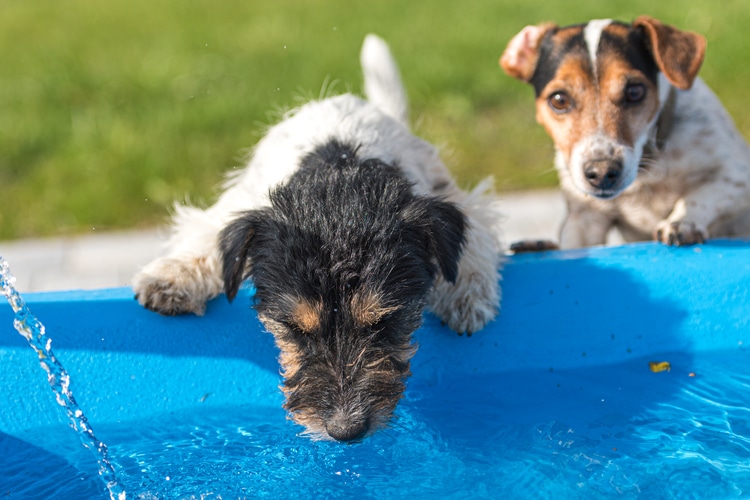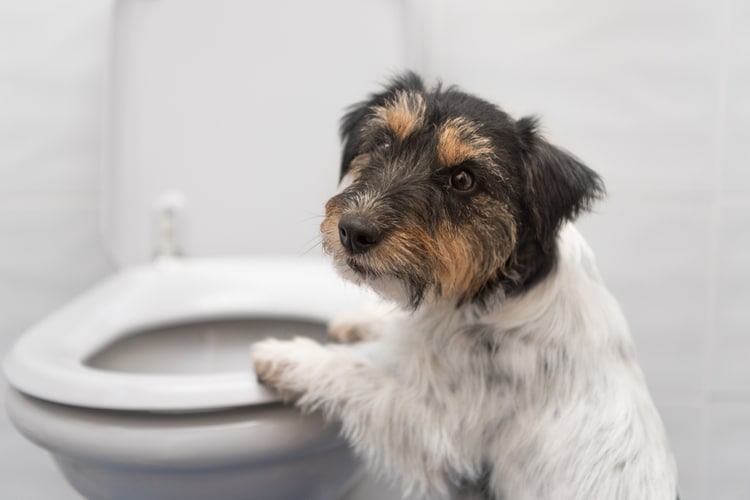The question of well water doesn’t often come up these days. The days of collecting water from the well are mostly over.
Technology has changed how people collect water, even for their pets and animals. Still, some continue to operate.
So can dogs drink well water? Although it might seem harmless, well water can be pretty detrimental to your dog’s health. Well water tends to contain more bacteria than filtered or distilled water, which could sicken your dog.
Is Well Water Safe for Dogs?

Since well water comes from the Earth’s aquifer, a natural filter makes it safe to drink most of the time. However, well water can be unsafe for dogs and other animals.
Sure, well water might seem like a safe option for dogs since humans often drink from that type of water source. However, well water can contain any number of harmful things. In particular, parasites and bacteria often make their way into well water, contaminating it.
Microorganisms like bacteria can come from water run-off, rainfall, or snow-melt. Regardless of their source, you won’t be able to tell if bacteria is flourishing in well water.
Groundwater movement can bring nitrates and nitrites into the drinking water. Heavy metals can also result in well water from a home’s plumbing system. As well, living next to any sort of agriculture increases the risk of animal contaminants in the well water.
The best way to know if a well is safe for your dog is to have the water tested. A test will show you exactly what contaminants are in your well if there are any.
Once you have established what is in your water, it will be easier to determine if it’s safe for your pooch to drink.
Well water tests can be conducted professionally, or you can purchase a home testing kit. Either way, you should obtain quick results to see if your well water is safe for dogs. Without bacteria or parasites, well water is safe for dogs.
Can Well Water Make Dogs Sick?
Well water can make dogs sick. If the well is contaminated, it can upset your dog’s stomach or make them seriously ill. In particular, well water that is soiled can pose a significant risk of sickness.
Unfortunately, wells are a breeding ground for contaminants that can harm your dog. The most common pollutants that could break out in well water systems are:
- Hepatitis A
- Giardia
- Campylobacter
- Shigella
- Cryptosporidium
- Elements such as arsenic, gasoline, or nitrate
Earth aquifers can act as natural filters for well water, but not every contaminant can be filtered before the pup drinks from a well.
If you live on a farm or near an industry of some kind, there’s also the risk of run-off impacting well water. Chemicals and cleaners seep into the groundwater, leading to potentially dangerous drinking conditions.
When your pup gets exposed to something like giardia, the conditions can be as mild as vomiting or as severe as death. The way they contract giardia is from drinking water compromised with feces.
Giardia is a single-celled parasite that resides in animal intestines. A dog most likely will contract giardia from well water that other animal feces have soiled. Testing your water for bacteria and parasites can help prevent this from happening.
Cryptosporidium is another sickness that a dog might get by drinking well water. It’s a parasite that can infect the cells of a dog and attack the immune system. Similar to giardia, cryptosporidium is caused by a dog consuming food or water that has been contaminated.
Since it can be easy for well water to be affected by outside sources, dogs who drink well water will likely encounter some form of bacteria. With that, comes the potential for sickness.
Can Well Water Give Dogs Diarrhea?

The sickness that a dog might catch from drinking well water can lead to diarrhea as a symptom. Typically, the contaminant is the culprit rather than the water itself.
If your dog is experiencing diarrhea after drinking well water, you probably have some kind of bacteria or parasite invasion. There are several illnesses a dog might catch from bad well water, and diarrhea is one of the common symptoms for each.
The parasites or bacteria that cause illnesses like giardia tend to live in an animal’s intestines, which explains why they lead to diarrhea. These parasites usually spawn from feces, seep into the groundwater, and infect a dog’s intestinal system.
Gastrointestinal illnesses in dogs are a severe risk when drinking soiled well water. Diarrhea is one of the common symptoms that will indicate toxicity in drinking water. If your dog is experiencing diarrhea, it could mean a severe issue with its health.
With that in mind, if you have any reason to believe that well water is causing your dog’s diarrhea, you should take them to see a veterinarian immediately.
What Type of Water is Best for Dogs?
The best water for your dog is tap water. It contains all the proper nutrients and minerals, doesn’t have the same risk for contamination as well water, and it’s cheaper than buying bottled water frequently.
Well water might contain harmful microorganisms, and pool or pond water is dangerous for a dog because it’s stagnant.
A dog needs just as much water as a human does, so finding ways to keep your dog hydrated is significant. A dog’s body is over 70% water, just like humans, which means water is just as important to them as it is to people.
Finding the right water source for a dog can be tricky. If you live near a lake or a pond or have standing water of any kind around, you might be tempted to let your dog drink from that. But stagnant water can be very harmful to a dog.
Distilled water might seem like a safe option, but it lacks the minerals a dog needs to hydrate correctly. It’s best only to give your dog distilled water in small doses.